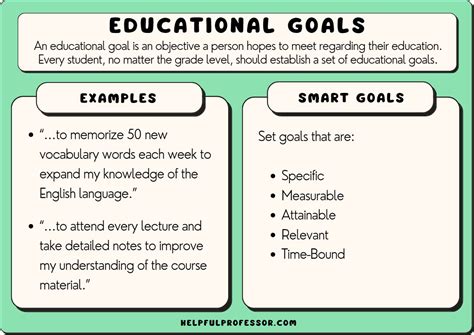The Importance of Educational Goals

Education is a lifelong process that can open doors to new opportunities and help you achieve your dreams. But to make the most of your education, it’s important to have clear goals. What do you want to learn? What skills do you want to develop? What career do you want to pursue?
Setting Educational Goals
The first step to setting educational goals is to reflect on your interests and passions. What subjects do you enjoy learning about? What activities do you find yourself drawn to? Once you have a good understanding of your interests, you can start to think about what you want to achieve through your education.
Types of Educational Goals
There are many different types of educational goals, including:
- Academic goals: These goals focus on your academic performance, such as getting good grades, completing a certain number of credits, or earning a degree.
- Career goals: These goals focus on your future career, such as getting a job in a specific field, starting your own business, or advancing in your current career.
- Personal goals: These goals focus on your personal growth and development, such as learning a new language, developing a new skill, or volunteering in your community.
How to Achieve Your Educational Goals
Once you have set your educational goals, it’s important to develop a plan to achieve them. This plan should include:
- Specific steps: What steps do you need to take to reach your goals?
- Timeline: When do you need to complete each step?
- Resources: What resources do you need to achieve your goals?
Benefits of Achieving Your Educational Goals
Achieving your educational goals can lead to a number of benefits, including:
- Increased earning potential: People with higher levels of education earn more money than those with lower levels of education.
- Better job opportunities: People with higher levels of education have more job opportunities available to them.
- Greater job satisfaction: People with higher levels of education are more likely to be satisfied with their jobs.
- Improved quality of life: People with higher levels of education are more likely to have a better quality of life, including better health and well-being.
Examples of Educational Goals
Here are a few examples of educational goals:
- “I want to earn a bachelor’s degree in computer science.”
- “I want to become a certified public accountant.”
- “I want to learn to speak Spanish fluently.”
- “I want to start my own business.”
- “I want to volunteer in my community.”
Tips for Achieving Your Educational Goals
Here are a few tips for achieving your educational goals:
- Set realistic goals: Don’t set yourself up for failure by setting unrealistic goals.
- Break down your goals into smaller steps: This will make your goals seem less daunting and more achievable.
- Create a timeline: This will help you stay on track and avoid procrastination.
- Find a support system: Surround yourself with people who will support you in your educational journey.
- Don’t give up: There will be times when you feel like giving up. But if you keep at it, you will eventually reach your goals.
FAQs
1. How do I set educational goals?
The first step to setting educational goals is to reflect on your interests and passions. What subjects do you enjoy learning about? What activities do you find yourself drawn to? Once you have a good understanding of your interests, you can start to think about what you want to achieve through your education.
2. What types of educational goals are there?
There are many different types of educational goals, including academic goals, career goals, and personal goals.
3. How do I achieve my educational goals?
Once you have set your educational goals, it’s important to develop a plan to achieve them. This plan should include specific steps, a timeline, and resources.
4. What are the benefits of achieving my educational goals?
Achieving your educational goals can lead to a number of benefits, including increased earning potential, better job opportunities, greater job satisfaction, and improved quality of life.
5. What if I don’t know what my educational goals are?
If you’re not sure what your educational goals are, start by talking to a guidance counselor or career counselor. They can help you explore your interests and develop a plan for your future.
6. What if I don’t have the resources to achieve my educational goals?
There are a number of resources available to help you achieve your educational goals, including financial aid, scholarships, and grants. Talk to your financial aid office or a guidance counselor to learn more about these resources.
Conclusion
Educational goals are essential for success in life. By setting and achieving your educational goals, you can increase your earning potential, improve your job opportunities, and enhance your quality of life. So what are your educational goals? Start thinking about them today and take the first step towards a brighter future.
